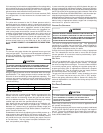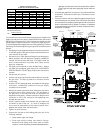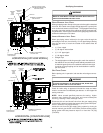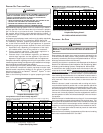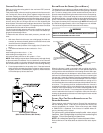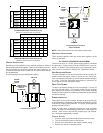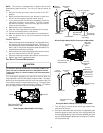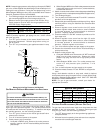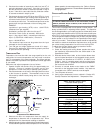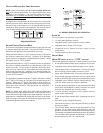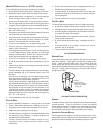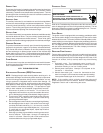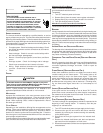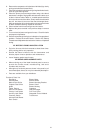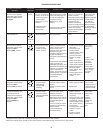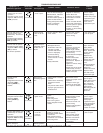
36
3. Calculate the number of seconds per cubic foot (sec/ ft
3
) of
gas being delivered to the furnace. If the dial is a one cubic
foot dial, divide the number of seconds recorded in step 2
by one. If the dial is a two cubic foot dial, divide the number
of seconds recorded in step 2 by two.
4. Calculate the furnace input in BTUs per hour (BTU/ hr). Input
equals the installation’s gas heating value multiplied by a
conversion factor (hours to seconds), divided by the number
of seconds per cubic foot. The measured input must not be
greater than the input indicated on the unit rating plate.
EXAMPLE:
Installation’s gas heating (HTG) value: 1,000 BTU/ft
3
(Obtained from gas supplier)
Installation’s seconds per cubic foot: 34 sec/ ft
3
Conversion Factor (hours to seconds): 3600 sec/hr
Input = (Htg. value x 3600) ÷ seconds per cubic foot
Input = (1,000 BTU/ft
3
x 3600 sec/hr) ÷ 34 sec/ ft
3
Input = 106,000 BTU/hr
This measured input must not be greater than the input
indicated on the unit rating plate.
5. Turn ON gas and relight appliances turned off in step 1.
Ensure all the appliances are functioning properly and that
all pilot burners are operating.
TEMPERATURE RISE
Temperature rise must be within the range specified on the unit
rating plate. An incorrect temperature rise may result in condens-
ing in or overheating of the heat exchanger. An airflow and tem-
perature rise table is provided in the Specification Sheet applicable
to your model.
Determine and adjust temperature rise as follows:
1. Operate furnace with burners firing for approximately ten
minutes. Ensure all registers are open and all duct
dampers are in their final (fully or partially open) position.
2. Place thermometers in the return and supply ducts as close
to the furnace as possible. Thermometers must not be
influenced by radiant heat by being able to “see” the heat
exchanger.
SUPPLY
AIR
RETURN
AIR
Temperature Rise Measurement
3. Subtract the return air temperature from the supply air
temperature to determine the air temperature rise. Allow
adequate time for thermometer readings to stabilize.
4. Adjust temperature rise by adjusting the circulator blower speed.
Increase blower speed to reduce temperature rise. Decrease
blower speed to increase temperature rise. Refer to Startup
Procedure and Adjustment -Circulator Blower Speeds for speed
changing details.
CIRCULATOR BLOWER SPEEDS
T
O
PREVENT
PREMATURE
FAILURE
OF
HEAT
EXCHANGER
,
PROPERTY
DAMAGE
,
PERSONAL
INJURY
OR
DEATH
,
DO
NOT
ADJUST
THE
LIMIT
CONTROL
(
FACTORY
-
SET
).
WARNING
This furnace is equipped with a multi-speed circulator blower. This
blower provides ease in adjusting blower speeds. The Specifica-
tion Sheet applicable to your model provides an airflow table, show-
ing the relationship between airflow (CFM) and external static pres-
sure (E.S.P.), for the proper selection of heating and cooling speeds.
The cooling blower speed is shipped set on HIGH, and the heating
blower speed is set as indicated in the Specification Sheet appli-
cable to your model. These blower speeds should be adjusted by
the installer to match the installation requirements so as to provide
the correct heating temperature rise and correct cooling CFM.
To adjust the circulator blower speed, proceed as follows:
1. Turn OFF power to the furnace.
2. Select the heating and cooling blower speeds that match
the installation requirements from the airflow table in the
Specification Sheet.
3. Relocate desired motor leads to the circulator blower heat
and cool speed terminals on the integrated control module.
(Terminals are identified as LO HEAT-H, HI HEAT-H and
COOL-H (hot)). If a heating speed and the cooling blower
speed are the same, a jumper wire must be used between
the heat and cool terminals.
4. Connect all unused blower motor leads to the “PARK”
terminals on the integrated control module. Any leads not
connected to the “PARK” terminals must be taped.
5. Turn ON power to furnace.
6. Verify proper temperature rise as outlined in Section XIV,
Startup Procedure and Adjustment - Temperature Rise.
LOW RED
MEDIUM LOW ORANGE
MEDIUM LOW BLUE
HIGH BLACK
COMMON/NEUTRAL WHITE
T1-LOW YELLOW
T2-MED-LOW RED
T3-MED ORANGE
T4-MED-HI BLUE
T5-HI BLACK
COMMON\NEUTRAL WHITE
*MH95, ACSH96, GCH95, GCH9
Circulator Blower Speeds
AMEH96, GME95
Circulator Blower Speeds



